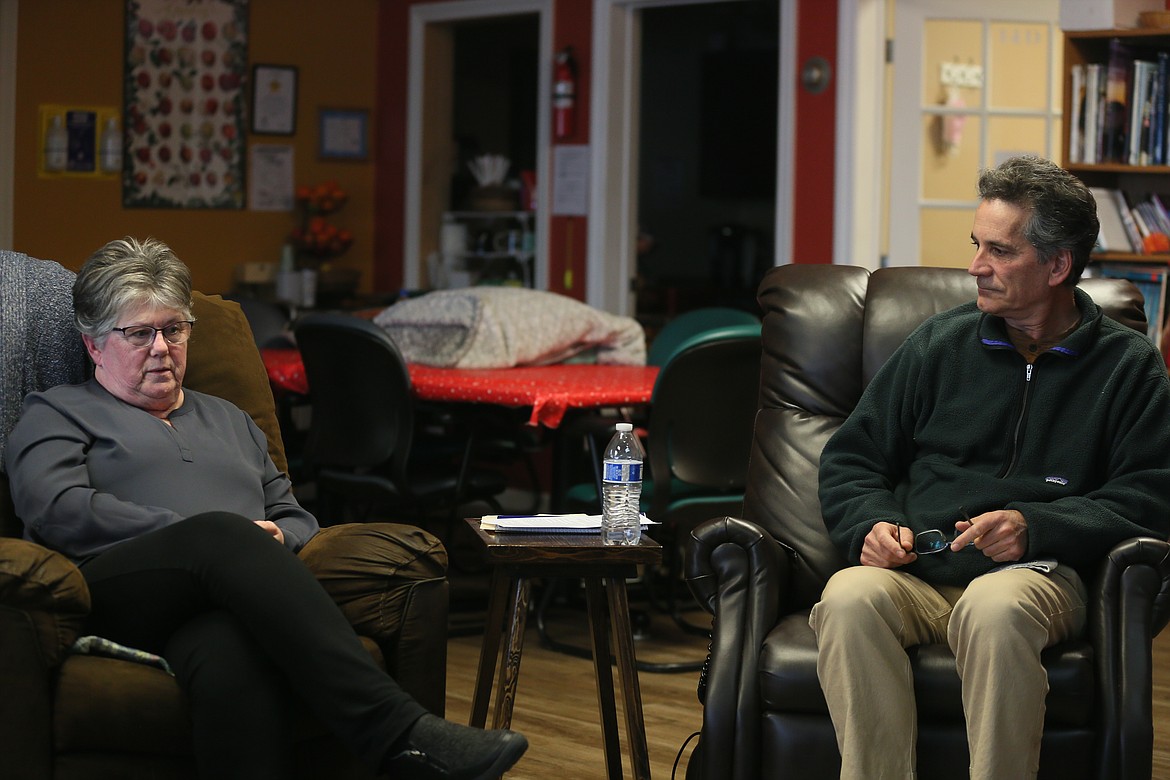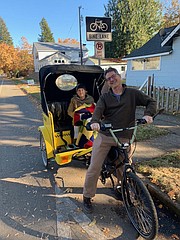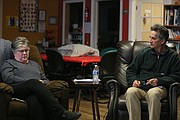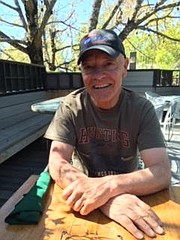Locked away but not forgotten
DEVIN WEEKS | Hagadone News Network | UPDATED 4 years, 3 months AGO
Devin Weeks is a third-generation North Idaho resident. She holds an associate degree in journalism from North Idaho College and a bachelor's in communication arts from Lewis-Clark State College Coeur d'Alene. Devin embarked on her journalism career at the Coeur d'Alene Press in 2013. She worked weekends for several years, covering a wide variety of events and issues throughout Kootenai County. Devin now mainly covers K-12 education and the city of Post Falls. She enjoys delivering daily chuckles through the Ghastly Groaner and loves highlighting local people in the Fast Five segment that runs in CoeurVoice. Devin lives in Post Falls with her husband and their three eccentric and very needy cats. | January 27, 2021 1:09 AM
Residents of long-term care and senior living facilities have been isolated from their loved ones and the rest of the world for nearly a year because of the coronavirus pandemic.
For those with dementia and Alzheimer's disease, the isolation has taken an exceptional toll.
For some, it's a death sentence.
"The lockdowns are supposed to help for the safety and wellbeing of our loved ones, and it’s only contributed to further decline," said Dave Passaro of Coeur d'Alene, whose mother has dementia and lives in his home.
"Somebody goes and sings outside a facility, all of a sudden there's a big story on it," he said. “There’s no story on the human suffering that’s going on."
Passaro and other caregivers/loved ones of those with dementia have formed an unofficial support group that meets once a month. With other support avenues closed or only held virtually, they felt the necessity to have in-person meetings, for their own sanity.
Many haven't been able to see their spouses in memory care units through much of the lockdown. Under Stage Two of Gov. Brad Little's Idaho Rebounds plan, vulnerable Idahoans should self-isolate, and long-term care facilities are not allowed to operate without requiring masks on their premises.
Memory care is lumped into the long-term care.
“It’s totally different than being in a nursing home," said Pat Ferriola, one of the main organizers of the support group. "They don’t seem to understand that."
Ferriola's husband, George, was in a memory care facility for 19 months. For 10 months, she was with him every day and he was doing fine.
When COVID hit, she was shut out for nine months. Pat started a letter-writing campaign to legislators and Idaho's health leaders to advocate for visitation and caregiver abilities for those with dementia and explain how they differ from other long-term residents.
"I got the tag of the ‘loud lady up in North Idaho' from the Boise people that told the local people up here, ‘Someone’s starting trouble,'" she said.
"It wasn’t to start trouble, it was to get somebody to sit down with us, talk to us, recognize the problem," Pat continued. "And I really did not get anywhere. Hardly any of the legislators answered and if they did it was their little terse form letter of all the wonderful things they were doing in the legislature for us."
She said support group members found that "everybody points the finger at the next organization and the next entity and nobody wants to get involved," so they contacted The Press for help.
“Maybe they’ll listen then? I still don’t know,” Ferriola said. “Things have changed for me, unfortunately. My husband passed away."
Her face grew red as she fought tears and reached for a tissue.
"I knew it was going to happen, but I’m still fighting for everybody else," she said. "I still have somebody in there. They’re not budging and it’s just ridiculous."
George died on Dec. 20 after recovering from COVID following an outbreak in his care facility. While recovering, Pat said George lost his ability to walk and was placed in a wheelchair. She was told he was too weak to walk. Then she called his doctor and it was quickly in his chart to keep him walking.
"That could have been the end of him right there," she said. "Without letting the families in to see what’s going on and to help, I bet there’s a lot of cases like that, people don’t even think about mentioning it to anybody. They've accepted that’s the course of it, and it’s not. It shouldn’t be."
Passaro's mom, Jean, was evicted from a facility.
"They gave me a 30-day notice to move her out because of behavioral issues,” he said. “The behavioral issues were 100% related to the care she was receiving because of the lack of staffing, the lack of loved ones visiting her, the lack of routine and activities and the lack of our ability to understand what was even going on."
Passaro said he would call the facility to check on his mom, but was never told that her toenails hadn't been cut in five months. She had also lost 15 pounds and was put on hospice care.
"The pedicure I had given her two weeks before the shutdown had totally grown out," he said. "Her toenails were all curled around, even though her care plan had to cut her toenails once a week during her shower. It didn't happen."
He said the facility blamed his mother's decline on her dementia, but he says "that's not true."
"The progression of her disease was a result of the depression caused by isolation and loneliness, and that’s what doesn’t get reported," he said, "the collateral damage of COVID, which has been the suffering of human beings, both family members and the patient, because of the lack of care."
Passaro and the others in the support group do not blame individual caregivers; they know the wages are minimal and the pool of dementia-trained caregivers is small.
“Those folks are under such pressure — 13 baths in an eight-hour shift. It's a constant challenge to get qualified people to any of those positions,” said group member Jana Mertens. "Where would a young person rather work, in a facility where they have to deal with someone with dementia that’s going to battle them when they’re trying to take a shower, or work at McDonald’s where they’re going to get the same pay?"
Mertens' husband also died in a memory care facility, also after being put in a wheelchair because it was "too much work" to get him up and walking.
"The caregivers were great, but there weren’t enough of them," she said.
The inconsistencies among the different homes and facilities has been extremely frustrating for those on the outside.
"If you were to talk to 100 different family members, you’d get a taste of all the inconsistencies that truly occur in the level of responsibility they’ve taken on the isolation piece," Passaro said.
Some facilities allow visitors on the porch or patio. Some quarantine residents when they go to doctor appointments. Some don't.
Ultimately, visitation protocols lie with each individual facility.
"But we armed them with guidance that let them balance the various factors that they need to consider in making decisions in the extent to which they would allow visitations," said Tamara Prisock, administrator for Idaho Health and Welfare licensing and certification, which licenses assisted living facilities in the state.
Found at https://coronavirus.idaho.gov/ under the long-term care tab, the guidance includes "compassionate care situations," which includes visitation allowed when a resident is struggling with his or her environment and lack of family support, needs help eating or drinking or is experiencing emotional distress.
"Visitation has been such a heartbreaking issue through this entire pandemic," Prisock said. "I completely understand how families feel, and their frustration in seeing different facilities under different policies."
She said the department cannot order facilities to allow people into their buildings.
"It's been really difficult to help people understand, as much as we empathize, we don’t have the authority to tell them they have to let them in," Prisock said.
IDHW director Dave Jeppesen said that's something that would require a change in state law.
"There are so many things to this pandemic that has broken my heart, and this is one of them. It's gut-wrenching," he said. "I'd love to say, 'Yes, let’s implement a compassionate care program,' but we simply don't have the authority to do so."
Hope is on the horizon, though.
"We are monitoring the vaccine rollout and are poised to revise the visitation guidelines as we start seeing more and more people in long-term facilities that are vaccinated," Prisock said. "Vaccinations should change the landscape around visitations dramatically."
A movement is taking place across the U.S. to change the state of isolation in long-term care facilities.
Info: https://caregivers4compromise.com/
SIDEBAR: North Idaho College offers a mental health certification program that includes preparation for the unique needs of people with mental illness, dementia and/or developmental disabilities.
A dementia workshop and virtual tour, adult mental health first aid and self-care for health care professionals are all part of the training.
"In assisted living, caregivers don't have any formal training other than on-the-job-training," said Dotty Heberer, health professions coordinator for the NIC Workforce Training Center. "Alzheimer's and dementia training is sparse, if at all."
COVID-19 has only exacerbated conditions for caregivers and patients alike. Heberer said it's been one concern after another as families worry about how their loved ones are cared for in long-term facilities.
"It speaks to how important family members are in the care of people with dementia," she said. "It's that connection, and when it's pulled away, their health deteriorates."
She said self-care is immensely important because caregivers are often overworked and experience compassion fatigue, "which makes it really tough."
Caring for memory patients takes time, she said.
"That's the problem. A lot of time our caregivers don’t have time," Heberer said. "If I could wave a wand, I would have the governor say loved ones of people with dementia have to be a part of their care plan."
Visit www.nic.edu for details about health professions, emergency services and mental health training.
MORE FRONT-PAGE-SLIDER STORIES

OPINION — Memory care centers: Lockdowns equal death
Coeur d'Alene Press | Updated 4 years, 10 months ago

Dementia patients cut off in midst of COVID-19 crisis
Coeur d'Alene Press | Updated 5 years, 1 month ago
ARTICLES BY DEVIN WEEKS

Geranium sale raises funds to help women reach academic goals
Geranium sale raises funds to help women reach academic goals.
Petals of radiant red, popping pink, vivid violet and pleasant peach were seen in the early Friday morning sunlight on the lawn of a home near Fernan Lake. Members of the Chapter AG Philanthropic Educational Organization carried trays of flowers and carefully organized pots as they prepared for about 700 geranium plants to go out into the community following a successful annual sale.

Students sharpen timber skills at Idaho State Forestry Contest
Students sharpen timber skills at Idaho State Forestry Contest
Cruising around a tall pine with a small measuring tape, Ava Stone examined the numbers and wrote them down on a paper secured to her clipboard. "It's the diameter, and then you take a clinometer from the 66 foot back and then the 100 foot back, then you look up and get the height to find out the board foot volume," she said Thursday morning.

Students sharpen timber skills at Idaho State Forestry Contest
Students sharpen timber skills at Idaho State Forestry Contest
Cruising around a tall pine with a small measuring tape, Ava Stone examined the numbers and wrote them down on a paper secured to her clipboard. "It's the diameter, and then you take a clinometer from the 66 foot back and then the 100 foot back, then you look up and get the height to find out the board foot volume," she said Thursday morning.








